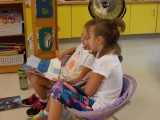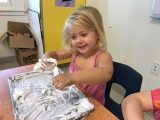-
Category 1
Selected in 2016
-
Grades: pre k - 5
School Setting: rural
Town Population: 1,400
Student Enrollment: 81
Student Demographics:
Black/African American: 0%
Teacher/Student Ratio: 1:13
White/Caucasian: 94.8%
Hispanic: 2.6%
Hawaiian/Pacific Islander: 0%
Asian: 2.6%
Native American: 0%
Other: 0%
% Reduced Lunch: 25%
% ELL Learners: 0%
Founded: 1870 -
PRINCIPAL:
Kristen Kivela -
CONTACT:
13 Darling Hill Rd
Mason, NH 03048
603-878-2962
kkivela@sau89.org
Mason Elementary School
Mason, NH
At Mason Elementary all teachers believe that they can be every child’s champion.
- Describe specific programs in place to ensure that families are involved in the success of your school and students.
-
A child’s development is best promoted when homelife and school life are partnered, and at Mason we have an Open Door Policy. By creating the feel that parents and their ideas are welcome cultivates an atmosphere for better communication. We encourage parents and family members to attend our Open House in September where they are able to visit with their teacher, tour the school, and attend the Scholastic Book Fair. Teachers invite parents into their classrooms to participate in classroom centers, read aloud to the students, and share their expertise on a topic. One program that has truly made an impact on the school culture is the Principal-Parent Meetings. These are meetings that are created to to allow the principal to hear positive feedback along with concerns parents may want to voice. The information is then presented to the staff where they are able to address the concerns and bask in the glory of given praise.
- Describe the most successful activity your school has initiated to strengthen ties to your community.
-
At Mason Elementary we truly believe the saying that “food is the ingredient that binds us together.” Our most successful activities are focused on having people of all generations sitting at a table and bringing the dinner table conversation back. Throughout the year we have multiple events that welcome members from the community into our school. Every month senior citizens within the town are invited to come have breakfast with different classes. When the school is not celebrating the senior citizens of the town, they are hosting the Mason Breakfast Club. This is a club that is intended for parents to come and have breakfast with other parents and share the trials and tribulations of parenthood. Two days during the school year we invite grandparents and parents to come in and have lunch with their loved ones. This is a time where family members get to create memories that everyone will cherish, because after all the best memories are made gathered around a table.
- Describe your philosophy of school change or improvement.
-
Everyone at Mason Elementary understands that we have one purpose and that is to create the heart and future of our community. We promote rigorous and ambitious academics that encourage our students to overcome barriers. We tackle the perplexity of educational content to allow students to learn how to solve problems in and out of the classroom. The teachers and staff support and develop an academic mindset so that children understand that their social status does not determine their success. We insist on mastery of concepts and do not allow our students to shy away from intellectual struggle. Our school improvement starts with our administration and their drive and vision has trickled down to the teachers who foster the same vision in our students. By expecting great things, we all get great things; students, teachers, parents, and community.
- What are your school’s top two goals for the next year?
- When determining school wide goals we understand that it is a roadmap to student achievement. This task is a shared leadership between the principal, teachers, and students. These goals help transform the way teaching and learning occurs for students. One goal that was generated for the next year was to go back to the basics and focus on math facts. Math facts are the foundation of all math concepts, and interventions will be held in the lower elementary grades along with setting grade level goals for students. Our second goal will be a continuation of student led conferences. The hope is to have a solid understanding of student led conferences for teachers and students so that the execution of these conferences can be meaningful for all involved. We would like to push our students’ growth mindset so that they take responsibility and pride in their work. Together the parents, student, and teacher can create an action plan and set goals to best assist the child in their success.
- What is the single most important factor in the success of your school that others could replicate?
-
At Mason Elementary all teachers believe that they can be every child’s champion. We take the time to understand every single student, not just on an academic level but also on a personal level. We use our sacred blocks of leveled reading and math groups to determine the educational needs of our children while also figuring out the underlying emotional and behavioral issues. We not only take time to reach our low achieving students but thrive at the opportunity to challenge and enrich the high performers. What makes Mason an exceptional school can not be found in any textbook but rather can be felt in the heart of every staff member and child that enters the building. Creating a nurturing yet demanding culture fosters excellent outcomes!
- Describe the program or initiative that has had the greatest positive effect on student achievement, including closing achievement or opportunity gaps, if applicable.
-
Students throughout the school are taught the importance of collaboration. The implementation of small leveled reading and math groups has had a positive effect on students’ academic achievement and their ability to collaborate with peers. For Mason Elementary, small, leveled, guided reading/math groups are a sacred time throughout the whole school. They allow students to to have an opportunity for a more active involvement with their academics and peers, develop a sense of academic rigor and willingness to share ideas, and provide students with immediate feedback on their learning. The structure and dynamic of these groups, along with the leadership of the teachers, is what makes the leveled groups successful. During this time each student is being taught at their individual reading/math level each and every day.
- Explain how Title I funds are used to support your improvement efforts.
-
Creating specific resources through the use of Title 1 funds has allowed academic gaps to gradually close school wide. The position of a Title 1 teacher fosters the need for differentiated instruction in areas of weakness in specific students. The teacher develops lesson plans for at-risk students to help them master reading, language, and math skills which may include pre-teaching or reteaching of concepts or vocabulary words. Before and after school tutoring builds on the skills being taught within the classroom and Title 1 sessions along with demonstrating strategies that can be implemented. The use of summer backpacks has encouraged students to continue their education progress throughout the summer. The backpacks include materials specific to each student and they are rewarded for their accomplished work upon arrival on the first day of school.
- Identify the critical professional development activities you use to improve teaching and student learning.
-
Informed and inspired teachers are one of the most important school-related factors influencing student achievement. As a school we are consistently addressing the ever-increasing demands; meeting yearly progress goals, reducing the achievement gap, adopting evidence-based practices, and remaining current on the pedagogical and content area research. As we identify the needs for professional development we try to focus on doing things well rather than doing the next best thing. We look within our school for information and strategies to execute with students. We develop ideas for professional development as a staff to ensure the subject matter will be beneficial to the teachers and improve students performance. As a school we also seek out local experts and look to other nearby schools for input on their experiences with educational programs. At Mason we understand that high-quality professional development strategies are essential to our school and the education of our students.
- Describe how data is used to improve student achievement and inform decision making.
- Every teacher and administrator at Mason shares one common goal; to see every student succeed. When taking the approach to analyzing data, we first establish a clear school wide vision. We make sure the data that we are collecting is consistent and effective throughout all grade levels. We review the information gathered through NWEA, Dibels, DRA, and standard based grading. Once the data is collected from the various sources it is used to group students within grades, differentiate instruction, collaborate with other staff members, improve identification of student learning outcomes, and has an increased sense of teacher efficacy. This information allows the teachers to identify the root of any challenges in academics and track the progress of the students in order to develop an accurate action plan to make a positive impact on our students. Data drives the educational changes in our practice and throughout our school culture.
- Describe your school culture and explain changes you’ve taken to improve it.
-
The first step in ensuring successful academics is to love and care for each individual that walks through the doors at Mason Elementary. These characteristics are evident the moment students and parents enter the building and are greeted by the administration and various staff members, each one standing there and smiling as a reminder that this is a safe environment. We pride ourselves on creating a setting that is welcoming, friendly, and positive. We break down the communication barrier between the parents and school by embracing parents who would like to contribute by volunteering, sharing a talent, having lunch with their child, or walking their loved ones to class. By overcoming the obstacles to communication it fosters a positive relationship between parents and their child’s teacher which in return benefits the students and their academics.
Stats
-
Category 1
Selected in 2016
-
Grades: pre k - 5
School Setting: rural
Town Population: 1,400
Student Enrollment: 81
Student Demographics:
Black/African American: 0%
Teacher/Student Ratio: 1:13
White/Caucasian: 94.8%
Hispanic: 2.6%
Hawaiian/Pacific Islander: 0%
Asian: 2.6%
Native American: 0%
Other: 0%
% Reduced Lunch: 25%
% ELL Learners: 0%
Founded: 1870 -
PRINCIPAL:
Kristen Kivela -
CONTACT:
13 Darling Hill Rd
Mason, NH 03048
603-878-2962
kkivela@sau89.org










